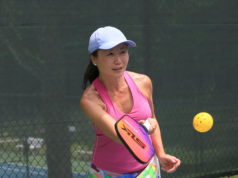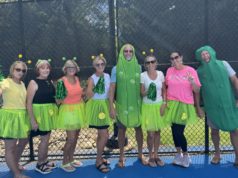WHAT DID SHE SAY?
An interesting thing happened to me on the court, and I’d like to know how to handle it according to the rules. I served to my opponent and she made a loud noise that sounded like “out” and hit the ball off the edge of her racket. I went to serve my second serve, as the ball she hit dropped just on the baseline. The opponent said she did not say “out.” She insisted that she said “ow” and that the ball was good. She said that the point was hers. We ended up letting her have it, but I’m curious how to handle that situation in the future.
Warren Fraser, Men’s League Vice President
ITF Rule 26 HINDRANCE says: “If a player is hindered in playing the point by a deliberate act of the opponent(s), the player shall win the point. However, the point shall be replayed if a player is hindered in playing the point by … an unintentional act of the opponent(s).” The Code, Section, 34 says: “If a player yells after an injury … , this is an unintentional hindrance that would entitle the opponent to claim a let.” Further, The Code, Section 36, says “A player who is hindered by an opponent’s unintentional act … is entitled to a let only if the player could have made the shot had the player not been hindered.”
In this case, the “ow” cry is an unintentional hindrance. The server presumably could have played the return since it landed on his own baseline. They should have played a let.
_______
OVERRULING THE OUT CALL
In a doubles match, my partner called a point out as I was about to hit the ball. I believed the ball was good and called it so and returned the ball to continue the point. Our opponents also continued to play and after two or three shots, we won the point. At that time, our opponents claimed the point since my partner had called the ball out and I had called it good and continued to play. Is this correct?
Warren Fraser, Men’s League Vice President
According to The Code, Section 14: “If one partner calls the ball out and the other partner sees the ball good, the ball is good.” An out call ends the point. If the call is changed to good, the side who made the out call loses the point.
_______
IT’S TIME FOR A SECOND CAN
During a summer Mixed Doubles match, the opponents — during a set, but between games — left the court for 10 minutes to go look for a ball. We still had two playable balls. We think they were stalling as one of them was getting overheated. They also took several minute breaks between games. Seemed like the match just dragged on. What’s the ruling on going to look for a ball between games? We offered to open a new can, but they refused.
Kim Davies, Thursday Women Vice President
According to the ITF rules of tennis under the heading “Continuous Play” found in USTA’s “A Friend at Court:” “As a principle, play should be continuous, from the time the match starts (when the first service is put in play) until the match finishes.”
It goes on to define the maximum time of breaks allowed as 20 seconds between points and 90 seconds between games. A 10-minute break is allowed between the second and third sets of a three-set match.
According to ITF Rules of Tennis, section IV.C. under “Standards of Conduct, No 6. “Leaving the court:” “A player may leave the playing area to retrieve a ball; for a toilet break; to obtain water when none is available on the court; to repair or replace broken clothing, shoes or necessary equipment other than the racquet.”
The rules do comment that the 90 seconds may be expanded “within reason” if a player has to chase a stray ball.
Since the rule of continuous play has specific times outlined for the breaks between points, games and sets, it seems clear that your opponents were “stalling” and that 10 minutes between games to retrieve a ball would not be considered within reason. Furthermore, ALTA provides that both teams provide one unopened can of balls. One to be used for the match and a second can to be opened in the event that during the match one or more of the original tennis balls are lost. If the second can is not used for the match, then the match winners are awarded that can of balls. Your suggestion to open your can of balls should have been taken so your match could be continued with only a reasonable interruption to retrieve the lost tennis ball.




